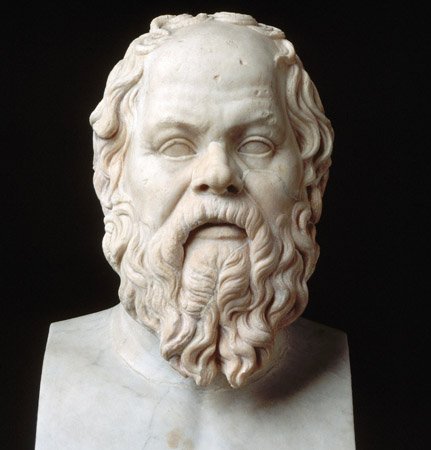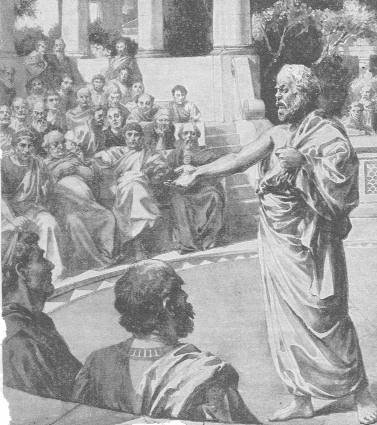Why Socrates Was Sentenced to Death
Unfortunately, we don't know anything about Socrates from Socrates himself. He never wrote and was most likely illiterate. We have three major sources where we learn about him:
- Plato - His student. After his death, Plato wrote numerous dialogues about him
- Xenophon - An Athenian historian; he covered the court transcripts of Socrates' trial
- Aristophanes - He depicted Socrates as a fool and particularly unwise

His Life
We believe he was born in c. 470 B.C. in Athens. The city-state was in the midst of a golden age due to a huge influx of wealth. Along with that money arrived a huge number of plays being written and monuments being constructed. This is the time where Athens becomes a mecca for philosophy, an age that most people recognize.
However Socrates was not born into a golden family. His father was either a sculptor or stonemason, while his mother worked as a midwife. His mother working implies that they were poor which suggests he might have never received a formal education. Well into his 50's he fought in the Peloponnesian War, and earned the Athenian equivalent of the medal of honor for his bravery at the Battle of Delium. This was a brutal and fratricidal war that split Greece in two. Every city-state had to choose between supporting Sparta or Athens. A true patriot, Socrates even did his part in the efforts to repopulate by getting a second wife.

The Charges
In 399 B.C. Socrates was prosecuted and eventually put on trial by a man named Miletus. He was charged with blasphemy and was claimed to be corrupting the youth. Blasphemy was taken very seriously as everyone feared to incur the wrath of the Gods. These claims of corruption stemmed from Socrates' engagement in pederasty. This wasn't the problem however, instead Socrates failed to provide anything in return to his partners since he was very poor. Although if you asked Socrates, he'd tell you that he was providing much to his students. He believed he was following in the footsteps of his mother, saying he was a midwife helping his pupils birth new thoughts and ideas.
Euthyphro
Plato wrote a very important piece of dialogue that allows us to understand what was going on at the time. Euthyphro documents the conversations between Socrates and a nobleman named Euthyphro. In it, Socrates questions Euthyphro of what he believes is just and unjust. He continues pressing him, forcing Euthyphro to change his answer multiple times until he's backed into a corner, unable to give him the right response. Socrates questioning Euthyphro was essentially him questioning authority. If he was doing it, then his young students would begin to do the same.
His Trial
Socrates was mainly put on trial because Athenians believed he was a danger to society. He was teaching the youth to question from their parents, to the government. The timing of this couldn't be worse as it was towards the end of the war. Between 1/8 to 1/10 of the population died because of a horrible plague, and in 405 B.C. their entire navy was destroyed. Athens was forced to surrender to Sparta and as a result, their government is changed. This means that at the time of this trial, the government was very fragile; no one wanted to risk a revolt.
He refused a prepared speech, believing his whole life led to this moment. His own defense speech ultimately, I believe, greatly contributed to his death. He claimed that everyone should be thanking him instead of putting him on trial. Socrates even offered a penalty: a house and free meals for life. Unsurprisingly, he was sentenced to death. Athenians did not want him to die however, the purpose of the trial was just to get him to shut up. If he died, they believed he would become a martyr.

Why didn't he try and do something about this?
There are three reasons why Socrates accepted his death. One is that he simply wasn't afraid to go; he was already in his 70's by this point. Another reason was that he felt the very same thing would happen if he fled, so there was no point in doing it. Lastly, Socrates was just willing to accept what his city-state demanded, he would not "break the contract" now.
Hemlock tea was given to him which caused numbness; starting at the feet, working its way up and shutting the organs down. His last words were "Crito, we owe a rooster to Aesklepius. Please don't forget to pay the debt." Some believe this meant that death was going to free him. However this may have also meant that his death would free Athens. Since he thought democracy was a bad form of government, he may have speculated that his death would prove it.

Nice post. It was calming to read something interesting. This is the type of content everyone should be voting for.
It was calming!
Wow, thank you so much! You have no idea how happy that makes me, I'm glad you enjoyed it.
P.S. I dedicate my blog to history and I try to write something everyday
Just keep posting what you like to. It'll pay off.
What a fun post! I'm a history major at CSULB, but I only recently started peeking around history tags, very excited to follow you, maybe I'll post some myself soon!
Thank you for your support! History is awesome and I hope more people can see that with my articles. Good luck to you as well!
beautiful writing on history... keep it up
Thanks so much!
agree, it was smoothly written and interesting, thanks,
Hi, we have upvoted and resteemed your post. Please follow us @steemiteducation and help us to make a difference! Use the education tag so that we can find your posts easier. :)
Thank you so much!
"A true patriot, Socrates even did his part in the efforts to repopulate by getting a second wife." Well this is one way to frame an argument lol
Socrates had an affinity for his city-state, as did almost all Greeks. He did not enjoy the company of his second wife but he felt that he was serving his state further by doing this.
So now we covered how to explain an affair and how to justify complaining about your wife in one post; patriotism and more patriotism!
It wasn't an affair, he was married to both women and in Athens, you could have multiple wives. You could always go back in time and take it up with them, I'm just stating the facts.It seems I completely misunderstood the point of your original comment. I apologize.
Yes, and I was just making an obviously lighthearted joke... so there really wasn't a need for an overly serious reply!
Thanks for the post. In this age of fake news and censorship by algorithms, perhaps a follow-up on the Socratic method may be opportune - or dangerous! :-)